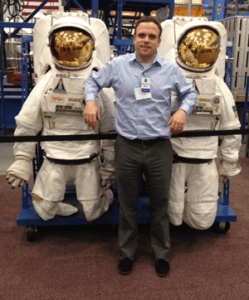TDC member Doug Dluzen interviews Christopher Mason, PhD, on the genetics and epigenetics of space travel.
February 2016

One of the most exciting research endeavors in human genetics isn’t happening entirely on Earth. Instead, you will have to look up towards the International Space Station (ISS). Astronauts Scott and Mark Kelly, identical twin brothers, are the focus of the Twins Study, part of NASA’s Human Research Program. The Twins Study is the first of its kind, a set of ten projects that comprehensively study the genetic and physiological changes that occur in the body after long-term space travel.
Understanding how living in space affects the human body is a critical step towards NASA’s objective of a human presence on Mars. The twins, with their identical genetic background and similar lifestyle and training, offer an ideal opportunity to assess these changes. In March, Scott Kelly will have spent one year in space, while his brother Mark, stayed on Earth.
Twins Study investigators will measure changes in the Kellys before, during, and after Scott’s year in space using specimens taken from buccal swabs, blood, urine, and skin samples. They will assess a broad spectrum of biomedical factors, including DNA mutation and alterations in structural variation, DNA methylation and changes in epigenetic risk loci, RNA expression, proteomic and metabolomic profiles, immunological response and inflammation, the gut microbiome, and differences in vascular and cognitive function.
Christopher E. Mason, PhD, Associate Professor in the Department of Physiology and Biophysics at Weill Cornell Medicine, leads one of the ten projects. His laboratory will study DNA and RNA methylation in the twins, changes in RNA expression, and mutations associated with extended time in space. Dr. Mason hopes that when the study concludes, the findings “will lead to biological knowledge and potential mitigation” of space’s effects, such as damage to the eyes. Although the results have yet to be published, preliminary gene expression and microbiome studies indicate that changes do occur and a distinct “person-ness” is maintained.
The Twins Study has not been without challenges. To make this project feasible, NASA designed and installed new freezers on the ISS and developed retrieval protocols to quickly get samples back to the lab. Dr. Mason has developed methods to sequence DNA in space, in hopes of preserving sample quality. “You really need to learn and understand the minutiae of your assay to get something that works here, a ‘terrestrial protocol’, to then work in space,” says Dr. Mason.
Interested in working in astrobiology in the future? Dr. Mason recommends trainees interested in the genetics of human space exploration obtain a deep understanding of genome biology, suggesting you can collaborate with other groups to develop new skills. He suggests digging “deep in the weeds” of chemical assays to learn how they might be altered in space, for example, potential changes in pH levels in buffers that could influence the experiment. In fact, astrobiology is now an option for medical student research at Weill Cornell Medicine, Harvard Medical School, and Baylor College of Medicine.
As Dr. Mason puts it, it is “very exciting to be human” as we begin to explore beyond Earth. Considering the potential for human biomedical research in space and what can be learned from the final frontier, indeed it is exciting.
